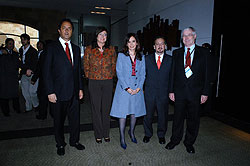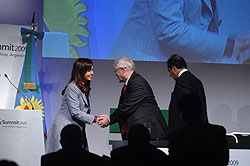Editor’s note – May 13, 2009 –
a reference to Microsoft’s investment in Argentina’s Educational Technology Access program was updated post-publication.
BUENOS AIRES, Argentina — May 13, 2009 — Microsoft Research kicked off its fifth annual Latin American Faculty Summit, where Argentine President Cristina Fernandez de Kirchner welcomed the more than 200 academic, government and industry research leaders from 15 Latin American and Caribbean countries to Los Cardales, province of Buenos Aires. During the keynote address, Microsoft Corporate Vice President of External Research Tony Hey announced the global availability of Microsoft Corp.’s WorldWide Telescope Spanish user interface release and increased funding to support the Latin American and Caribbean Collaborative ICT Research Federation (the Virtual Institute) to include the third round of RFP funding and support of the graduate exchange program.

Group Photo with President: Daniel Scioli (Gov of Buenos Aires); Sandra Yachelini (Microsoft Argentina & Uruguay General Manager), Cristina Fernandez de Kirchner (President of Argentina), Lino Barañao (Minister of Science, Technology and Innovation for Argentina), and Tony Hey (Corporate Vice President, Microsoft External Research).
In addition, Sandra Yachelini, general manager of Microsoft Argentina and Uruguay, announced the Educational Technology Access program and the availability of DreamSpark in Uruguay and Argentina, which will provide students with software design and development tools at no charge to help them innovate and prepare for future careers. This news is part of Microsoft’s broader efforts to strengthen the region’s research community and foster opportunities for faculty and students.
“Science and technology are key drivers of socioeconomic growth, but the current global economic conditions make it challenging for many governments and institutions to continue investing in academic and scientific research,” said Hey, who heads up Microsoft External Research, the division of Microsoft Research that collaborates most closely with the worldwide academic, government, industry research and scientific community. “In these challenging times, Microsoft Research hopes to be of even greater support as a strategic partner in the development of research capacity and advanced information technology throughout the Latin America and Caribbean region.”
The Microsoft Research Faculty Summit in Argentina focuses on collaboration between computer scientists and other disciplines, as well as Microsoft Research work with Latin American and Caribbean universities. Attendees had the opportunity to explore research results and directions through more than 20 key talks and research sessions scheduled over the three days of the conference. Topics ranged from science, technology and innovation as drivers for social and economical development in Argentina and Latin America to tools and services for data-intensive research. A DemoFest featuring 20 of the most innovative technology projects from Microsoft Research and researchers from Latin America and the Caribbean region will mark the last day of the summit.
More details about the announcements made at the summit are as follows:
-
The WorldWide Telescope is an online virtual telescope that allows users to visually explore the universe from their desktops by bringing together research from the fields of computer science and astronomy. Microsoft Research, along with Professors Guillermo Bosch and Roberto Venero from Argentina’s Universidad Nacional de la Plata, worked for three months to develop and validate the Spanish-language user interface that individuals can now access from http://www.worldwidetelescope.org. In addition, Microsoft released a tool to enable people using the WorldWide Telescope to download the WorldWide Telescope Academic Development Kit on their local computers and localize other languages common to the region. Like the collaboration with the Universidad Nacional de la Plata to support the Spanish user interface, this tool provides the opportunity for Microsoft Research to work with local astronomers toward a future rollout of additional language support.
-
Microsoft Research’s contribution of $300,000 (U.S.) to the Virtual Institute will increase research opportunities for faculty and graduate students in the region, and brings Microsoft Research’s total investment in the institute to $1,540,000 (U.S.) since its inception in 2007. In addition to increased funding to the Virtual Institute, Microsoft is announcing a new short-term graduate exchange program to foster international research collaborations across the region. The total amount available through this new program is $75,000 (U.S.).Through the Virtual Institute, Microsoft Research has helped fund 10 research projects in the past year and a half, with topics ranging from bioinformatics and biotechnology to digital inclusion through mobile and wireless technologies. Gabriel Baum, computer science professor at the Universidad Nacional de la Plata in Argentina, along with colleagues from Universidad de la República and Universidad ORT in Uruguay, and El Instituto Nacional de Tecnología Agropecuaria in Argentina, recently received funding for the project “Low-Cost, Computer-Based System for Quality Evaluation and Preservation of Grains Stored in Polymer Bags.” The Virtual Institute is a collaborative effort between Microsoft, the Organization of American States and the Inter-American Development Bank (IDB). The institute has applied for additional matching funds from the IDB.
“The support that some academic teams receive from Microsoft Research is significant. In my case, an interdisciplinary team I am part of, obtained an RFP grant from the Latin American and Caribbean Collaborative ICT Research Federation to develop an application that will help contribute to the competitiveness of the agribusiness sector, which is fundamental to the socioeconomic development in Argentina,” Baum said.

Tony Hey shaking hands with Pres. Cristina Fernandez de Kirchner. (Behind them is Gov. Daniel Scioli)
Microsoft is launching DreamSpark in Uruguay and Argentina, which offers students software design and development tools at no charge to equip them with the professional tools to help them innovate and prepare for future careers. The program hopes to benefit 10,400 students throughout Uruguay and 100,000 students in Argentina.
Microsoft believes the private sector can play a key role in facilitating the advancement of research in the region. According to a recent study by the Ibero-American Network of Science and Technology Indicators, Latin American countries spend less than 1 percent of their gross domestic product on research and development (R&D), and represent approximately 1 percent of the total global investment in R&D, which is significantly below North America, Europe and Asia, which lead at 39 percent, 31 percent and 26 percent, respectively.
“One of the endemic problems in the scientific and technological development of the region is the low presence of the private sector,” said Alvaro Soto, associate professor, Department of Computational Science at the School of Engineering in Pontificia Catholic University in Chile. “In this sense, the Microsoft Research constant initiatives, such as directly supporting projects or creating bridges to connect researchers throughout the region, are without a doubt a great example to follow, and therefore fundamental to the growth of advanced scientific research in Latin America.”
Since establishing a presence in Latin America and the Caribbean region in 2003, Microsoft External Research has maintained a strong focus on fostering collaboration — an essential element in expanding research capacity. Its research engagements and projects are aimed at addressing issues of particular interest within the region and at building lasting collaborative partnerships between researchers. In the past six years, Microsoft Research has invested approximately $6 million (U.S.) through research grants, technology learning labs, regional research summits, internships and doctorate fellowships. Microsoft Research has supported more than 50 collaborative research projects in the region in fields such as education, healthcare, agribusiness, e-government and human-computer interaction. In addition, Microsoft External Research has granted 40 internships and doctoral fellowships since 2004.
Microsoft also recently selected Argentina as one of 10 countries worldwide to benefit from the Educational Technology Access program “Your Potential Without Limits,” which seeks to promote digital inclusion by providing products that will aid in systems administration and technology development. The initiative hopes to reach more than 300,000 students at university and technical schools in Argentina. Participants will have access to operating system, server and design tools.
The Microsoft Research Faculty Summit in Argentina is sponsored by Ministerio de Ciencia, Tecnologia e Innovaction Productiva; Consejo Nacional de Investigactiones Cientificas y Técnicas (CONICET); Software and IT Services Chamber of Commerce (CESSI); United States Commercial Chamber (AMCHAM); Federation of Associations of Information Technology Entities from Latin America, Caribbean and Spain (ALETI); and IT and Communications Chamber of Argentina (CICOMRA).
More information on these programs can be found in the Microsoft virtual press room at http://www.microsoft.com/latam/presspass.
About Microsoft Research
Founded in 1991, Microsoft Research is dedicated to conducting both basic and applied research in computer science and software engineering. Its goals are to enhance the user experience on computing devices, reduce the cost of writing and maintaining software, and invent novel computing technologies. Researchers focus on more than 55 areas of computing and collaborate with leading academic, government and industry researchers to advance the state of the art in such areas as graphics, speech recognition, user-interface research, natural language processing, programming tools and methodologies, operating systems and networking, and the mathematical sciences. Microsoft Research currently employs more than 850 people in six labs located in Redmond, Wash.; Cambridge, Mass.; Silicon Valley, Calif.; Cambridge, England; Beijing, China; and Bangalore, India. Microsoft Research collaborates openly with colleges and universities worldwide to enhance the teaching and learning experience, inspire technological innovation, and broadly advance the field of computer science. More information can be found at http://www.research.microsoft.com.
About Microsoft
Founded in 1975, Microsoft (Nasdaq “MSFT”) is the worldwide leader in software, services and solutions that help people and businesses realize their full potential.
Note to editors: If you are interested in viewing additional information on Microsoft, please visit the Microsoft Web page at http://www.microsoft.com/presspass on Microsoft’s corporate information pages. Web links, telephone numbers and titles were correct at time of publication, but may since have changed. For additional assistance, journalists and analysts may contact Microsoft’s Rapid Response Team or other appropriate contacts listed at http://www.microsoft.com/presspass/contactpr.mspx.




